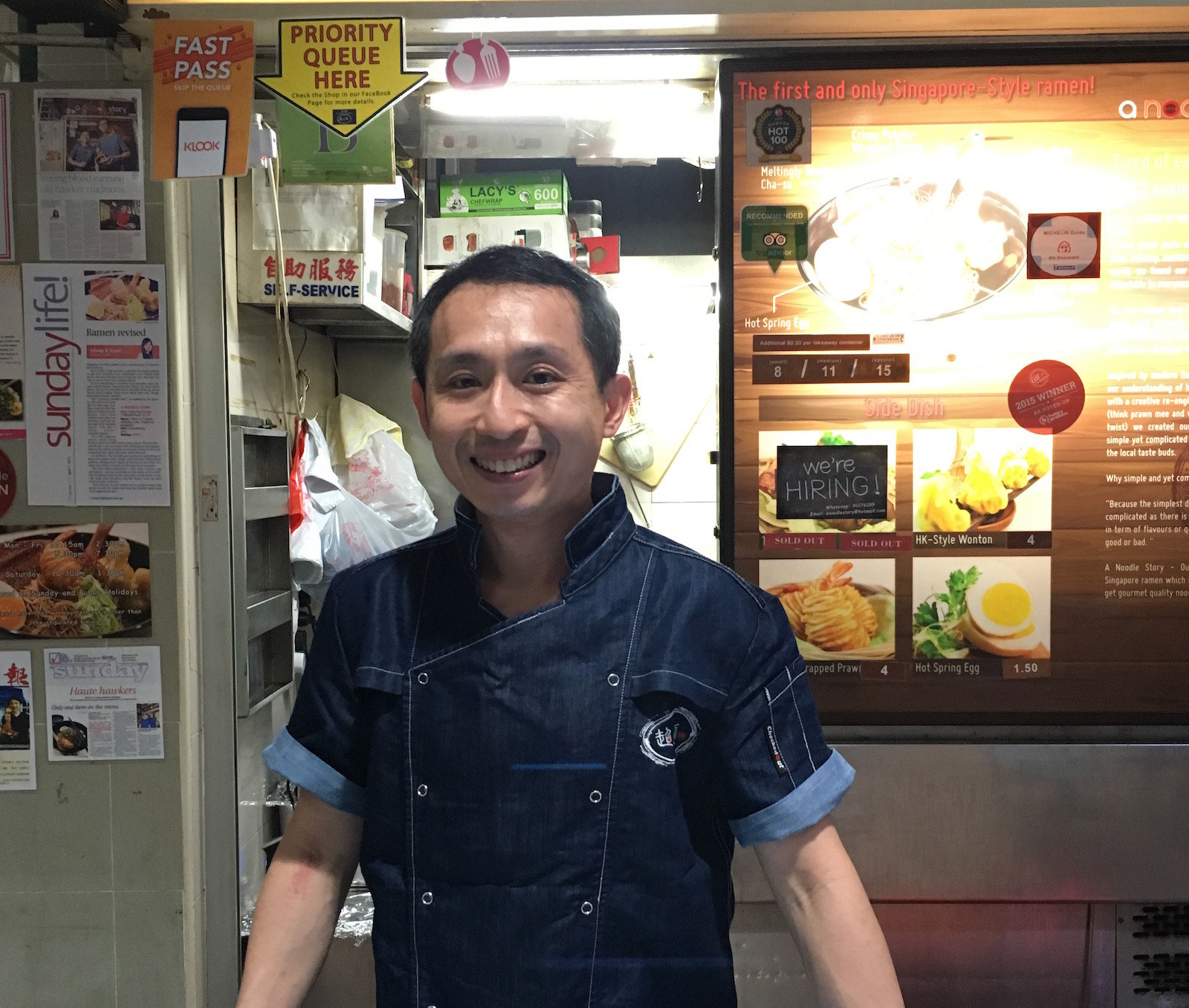How do you succeed as a hawker in the food utopia that is Singapore? We ask former fine-dining chef turned ramen hawker Gwern Khoo who’s been dealing with long queues outside his Michelin Bib Gourmand certified noodle stall—A Noodle Story—for seven years now.
“It’s a continuous cycle of repeated improvement.”Q: Hi Gwern! How did you end up as a hawker? Was it a life-long dream or pure chance?
A: I’ve always loved to create new dishes, even when I was a chef. I’m very happy when people come up to me and say they like my food.
What I really want is to start my own business and let customers enjoy my creations. The hawker centre is a cheaper way for me to test out my ideas and concepts.
There was an uptrend in Japanese cuisine, especially ramen, 6 years ago. I knew I couldn’t fight head-on with those famous chains from Japan so to leverage this trend, I started my S-style ramen. Somewhat same but still differentiated from the usual ramen and hawker fare.
I chose the CBD [central business district] because of the demography. Now, more youngsters are well-travelled and willing to try new things. And they are willing to pay for quality and unique concepts.
What academic certifications, training or experience does a person need to be qualified to work as a hawker, and how did you acquire those yourself?
You don’t need any certification. Of course, experience in cooking is a must. And passion and hard work, lots of it.
How much, approximately, did acquiring the above cost and how did you pay it off?
Although certification is not a must, I do have a diploma in culinary skills. [It took me] 2 years to get that.

How long after becoming qualified did it take you to get your first job as a hawker? How did you know of the job opening and what did you have to do to get hired?
My first job was Cook at a restaurant. Got it immediately after graduation. There’s a shortage of able staff in this industry.
How old were you when you started training to be a hawker?
I started my cooking course when I was 26.
How old were you when you finally became a professional hawker?
I ventured out when I was 32 years old.
Which 3 aspects of the job do you enjoy the most?
The joy of happy customers. Creating my own flavours and dishes. Learning deeper about the subject.

What do you currently do at work on a regular basis?
Training and teaching my team.
What is the work schedule of a hawker like? Do you have to work on weekends?
Long hours. I work on Saturdays.
What is the salary of a hawker like? Are there other benefits?
It depends on your popularity. It can be anything from losing money to making many thousands.
Which 3 objects/people are most useful for you when you are at work?
Cooking is all about senses. I rely on my senses for work. Eyes to see, observe and judge. Hands to feel and touch. Brain to think and create.

Which place in Singapore is most useful?
Home for rejuvenating.
Name 3 people you’ve ever tried to emulate over the course of your career and explain why.
Ferran Adria for creativity. Thomas Keller for excellence. Tetsuya Wakuda for his simplicity.
What did you learn from becoming a professional hawker that you didn’t know before?
Tougher than I thought.
What’s the worst advice you’ve been given, or have heard people giving, with regards to being a hawker, and what’s the best?
For worst: “It’s easy to make money, most hawkers drive Mercedes.”
For best: “People will come if the food is good.” That was most helpful when I just started out building a sustainable base of customers.

If you could replay your entire career all over again, what would you change?
Perhaps increasing my selling price earlier. I was selling like mad, working 16 hours a day for 3 years. No life, no time and income was low. I was naive and set my prices based on my neighbours’. But our rental, food costs and production are different from theirs. I was selling way too cheap.
What advice do you have for those hoping to become professional hawkers too?
Be prepare to work long hours. Listen to customers’ feedback, improve and make it happen. It’s a continuous cycle of repeated improvement. Sooner or later, you will succeed.

Lastly, when do you think you will retire or quit from this job?
Not sure, it’s still a long way to go.
Gwern is presently busy with opening new hawker concepts, which he hopes to be able to set up within the next year. You can follow him on his Facebook page, or let him know if you’ve enjoyed his S-style ramen using the comment box below.
Interviewer Note:
Sometimes I go to Amoy Street Food Centre for lunch. Every time, without fail, there would be a queue outside Gwern’s noodle stall. I’ve never actually tried his food (ironically because of the queues) but my gut’s telling me the guy must be doing something right. So I am curious: What is it about his noodles that makes people brave hunger and heat and having to stand in limbo for tens of minutes at a go? 😮 If you’re a fan, please do tell.
Photographs courtesy and copyright of Gwern Khoo. Interviewer: Sy
If you found this article useful:

Say something: